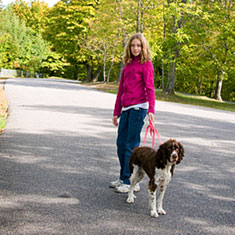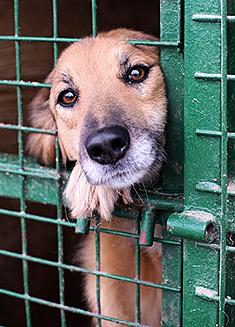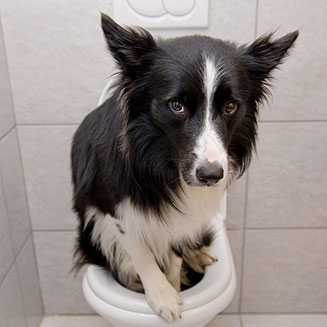Dog Laws
A recent poll on the doggies.com blog indicated that a lot of us are totally unaware of the dog laws where we live. As they say, "Ignorance of the law is no excuse." It can be both dangerous and costly to stay in the dark. And dog laws are often changed without much notice. In just one year (2007), 43 new dog laws were passed – 42 at the state level and one at the federal level.
Although each state and municipality has individual quirks, below are some of the common types of laws concerning our canine friends.
Breed Specific Legislation
Some states and many cities have or are considering breed specific legislation. These types of laws don't take into account the fact that canine aggression is usually more dependent on breeding practices, training, and socialization (or the lack thereof) than on breed.
The Pit Bull is the breed most often assumed to be vicious simply by virtue of breed. Other dogs commonly included in breed specific legislation include Rottweilers and Dogos Argentino, Cane Corsos, and Presa Canarios. Breed specific legislation may ban the affected breeds entirely or may require that specific precautions be taken. Examples include pens with enclosed tops, specific types of leashes, or off-premise muzzle requirements.

Vicious Dog Laws
Vicious dog laws are similar to breed specific laws in that they force owners to take specific precautions to protect the general public from certain dogs. However, instead of identifying these dogs by breed, vicious dog laws take into account that any dog can become vicious as a result of training or abuse.
Most states define vicious dogs based on past behavior. For example, if the dog has killed another dog or has bitten a person without provocation, the dog might be said to be vicious. The problem, of course, is that someone has to have been injured before the dog is declared dangerous.
The other issue with vicious dog laws is that the definitions of terms like "vicious" and "dangerous" may be fairly vague, allowing a certain amount of wiggle room on both sides. This gives the attorneys something to bill for when there is a lawsuit.
For example, if my Australian Shepherd has nipped at the heels of the child next door, then one day bites the child in the face, my neighbor's lawyer might say that the dog should have been classified as dangerous because of the previous nipping behavior. My attorney, on the other hand, might argue that nipping is a normal behavior for herding dogs and does not indicate any propensity toward biting children.
Once a particular dog meets the criteria to be categorized as "vicious", the laws typically then go on to specify the types of precautions the owner must take. Extra liability insurance may be required to assure that dog bite victims receive adequate compensation. As with breed specific legislation, there may also be leash and muzzle requirements when the dog is off of your property and special caging requirements for time spent on your property.
Leash Laws
Even if your dog is not vicious and not subject to breed specific legislation, there may still be leash laws that apply to you. The major point of a leash law is that your dog must be under your control whenever he is off of your property.
Depending on how the law is worded in your area, you may be allowed to have a well-trained dog off leash as long as the dog responds immediately and without question to your commands. In other jurisdictions, a leash may be required at all times regardless of the dog's training.
In some areas, the person who is with the dog must be capable of controlling the dog irrespective of whether or not a leash is in use. Therefore, you might want to re-think sending your five-year old out to walk your exuberant Labrador Retriever.
Animal Control Officers
Depending on jurisdiction, animal control officers (sometimes called dog wardens) may have very broad or very specific authority. In some areas they have the power to remove at-risk animals and arrest negligent or abusive owners. In other areas, they may work with local police to accomplish the same tasks.
Animal control officers may also be charged with housing strays, destroying vicious, injured, or very ill animals, administering the dog license program, and issuing citations for various infractions of the law.
These tickets can end up being very expensive for the dog owner. For example, if your dog escapes from your property and is found running loose, you may be cited because the dog is off of your property, yet not under your immediate control. The fine for this misdemeanor is often north of $100 for the first offense.
Dogs found running loose are also subject to being shot, usually with a tranquilizing dart. Animal control officials in some areas are equipped with a shotgun-style device that allows them to sedate your dog from a distance if the officer feels your dog may present a hazard. In extreme cases, a loose dog may be shot with a real bullet to prevent injury to people or livestock.
Protecting Your Dog
All of the above laws are aimed at protecting people from dangerous dogs. Other laws are meant to protect dogs from us. Organizations such as the ASPCA, the American Kennel Club, and the Humane Society of the United States have lobbied for laws requiring every pet to be spayed or neutered, restricting how dogs can be tethered outside, and questioning the necessity of vaccinating for rabies every three years.
For More Information
To learn more about laws regarding dangerous and vicious dogs, check out Dog Bite Law, which includes a comprehensive collection of articles on all sorts of legal topics for dog owners, dog bite victims, parents, journalists, lawmakers, students, lawyers, and canine professionals, written and compiled by attorney Kenneth Phillips.
Michigan State University's College of Law offers a searchable list of laws for each state in the Union.
Hug Pug has a list, classified by topic, of laws pertaining to apartment-dwelling dogs, traveling with your dog, barking dogs, and providing for your dog in your estate.
Doggies Den: Latest Articles
 Homemade Thanksgiving Treats for Your Dog
Homemade Thanksgiving Treats for Your Dog
NUTRITION We all want to include our dogs in our holiday celebrations, but hopefully, you're aware that sharing table scraps with your dog isn't always the best idea.
 Keeping Your Dog Safe during the Summer Months
Keeping Your Dog Safe during the Summer Months
HEALTH Summer is coming on fast, so it’s time to plan how you will keep your dog safe and healthy through the lazy, carefree, warm days.
 Vaccination Time Again-Keeping Your Puppy Healthy
Vaccination Time Again-Keeping Your Puppy Healthy
DOG HEALTH So you have your new puppy picked out. There are quite a few shots, treatments and examinations that will keep the newest member of your family healthy.
 Canine Thanksgiving Feast
Canine Thanksgiving Feast
NUTRITION With the wide variety of food at Thanksgiving dinner, chances are you'll want to give your dog something special, too. If you're contemplating what to feed your dog for the holiday, here is a guide to a great Canine Thanksgiving Feast.
 Dog Walking Tips Every Owner Should Know
Dog Walking Tips Every Owner Should Know
DOG FUN Walking your dog is not only crucial to keeping him healthy and happy, it strengthens the bond between your canine friend and his caregiver. There are a lot of obstacles out there. Don’t forget these simple tips to keep your walk fun and safe in the outside world.
 The Benefits of Physiotherapy for your Dog
The Benefits of Physiotherapy for your Dog
HEALTH The same techniques that physiotherapists use to treat a variety of injuries and conditions in humans have been adapted to suit animals with great success. Family pets, show dogs, and working dogs can all benefit greatly from physiotherapy. Dogs whose activities involve a lot of agility are especially susceptible to the types of problems that physiotherapy can address.
 The Decision- Adding a Dog to Your Family
The Decision- Adding a Dog to Your Family
FIRST TIME OWNERSBringing a dog into your family is a decision where many people don’t realize it’s magnitude until after they have the dog. There are a number of things that you need to research before you decide to purchase a dog, and it starts right in your own home.
 Bringing Your Dog Into Your New Baby's Life
Bringing Your Dog Into Your New Baby's Life
HEALTH Many believe that a dog and a new baby cannot happily coexist, so therefore the dog has to go. This is not necessarily the case.  A new baby does not mean you have to abandon your dog.

Doggies Den:
Most Popular Articles

Dog Pregnancy Symptoms
HEALTHIf you suspect your dog might be pregnant, check out part one in this series on pregnant dogs, where we cover pregnant dog symptoms.

Dog Birth
HEALTHIn the third article of our dog pregnancy series, we look at the wonderful, but messy, process of bringing newborn puppies into the world.

Indoor Dog Potties
DOG PRODUCTSIt's been a long day at work. You were so busy, you didn't even take time to eat a sandwich, let alone run home to let your dog out. You're on your way home, knowing the poor dog is crossing his or her legs by now, when your car breaks down, delaying you even further. Can't somebody make this easier?

Your Dog’s Digestive System
PHYSIOLOGYEver wonder why your dog eats so fast? Or why he eats gross things? Or why he gets sick to his stomach? Or why his waste stinks so bad? Some of these things are normal, some are not.

Canine Respiratory System
BREATHINGThe basic function of your dog's respiratory system is to bring oxygen in to and remove carbon dioxide from the body. Knowing the symptoms of respiratory diseases can help you help your stay healthy.

Shelter Dog Adoption Tips for Success
ADOPTION Are you intimidated by the prospect of "rescuing" a dog from a shelter? One reason that you may be wary of adopting a dog from a shelter is not knowing how to choose. Adopting a dog from a shelter can be a rewarding process, if you're prepared to do a reasonable amount of research.

Canine Urinary Tract Infections
SYMPTOMS AND TREATMENTDoes your dog seem to be having trouble relieving his or her bladder? Learn how to recognize the signs of urinary tract infections and how to treat them before they spread.

What to do for Dog Diarrhea
SYMPTOMS AND REMEDIESIf you have dogs in your house for any length of time, you have likely experienced at least one bout of dog diarrhea. Beyond the pain in the tuckus involved in cleaning up the mess, you should know what causes diarrhea, and when it's important to see the vet.

What to do for a Dog Bite
DOG BEHAVIOR Getting bitten by a dog can be scary, and you may be tempted to run around in circles for a while, trying to figure out what to do. Here's our guide to help you manage the situation.

Top Ten Tips for Living with a Senior Dog
DOG HEALTH Bringing home a new puppy is so exciting, but it doesn’t take all that long for your exuberant puppy to grow into a senior dog who may have special needs. Here are the doggies.com top ten tips for taking care of your companion who has been with you through so much.
